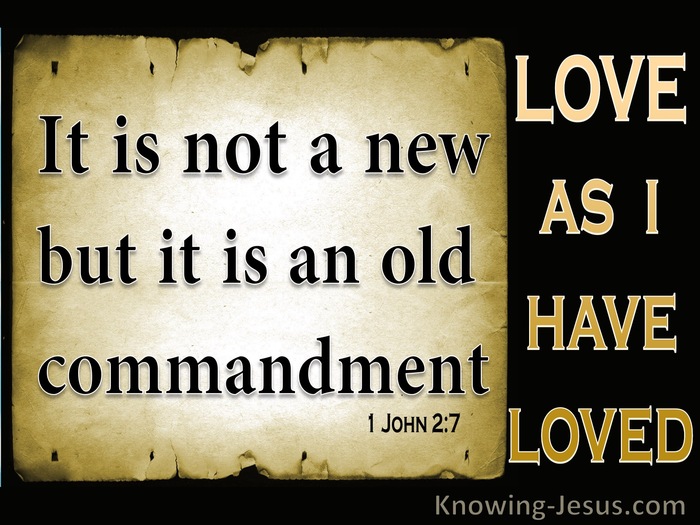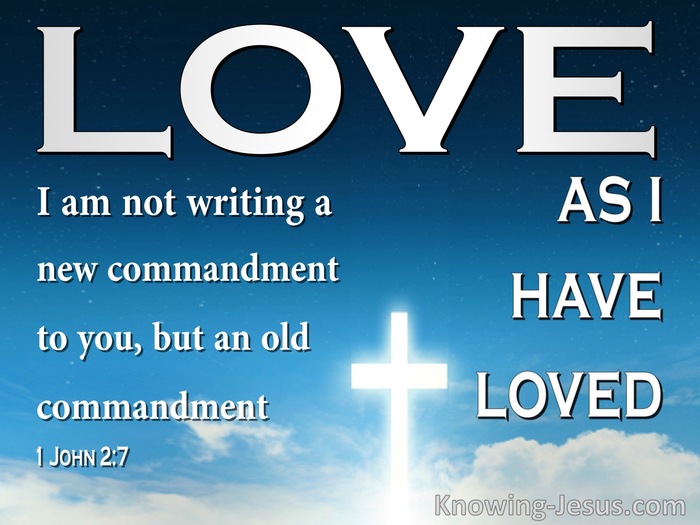Parallel Verses
Emphatic Diaglott Bible
Brethren, I do not write a new commandment to you; but an old commandment, which you had from the beginning. The old commandment is the word, which you have heard from the beginning.
New American Standard Bible
King James Version
Brethren, I write no new commandment unto you, but an old commandment which ye had from the beginning. The old commandment is the word which ye have heard from the beginning.
Holman Bible
Dear friends, I am not writing you a new command
International Standard Version
Dear friends, I am not writing to you a new commandment, but an old commandment that you have had from the beginning. This old commandment is the word you have heard.
A Conservative Version
Brothers, I write no new commandment to you, but an old commandment that ye had from the beginning. The old commandment is the word that ye heard from the beginning.
American Standard Version
Beloved, no new commandment write I unto you, but an old commandment which ye had from the beginning: the old commandment is the word which ye heard.
Amplified
Beloved, I am not writing a new commandment to you, but an old commandment which you have had from the beginning; the old commandment is the message which you have heard [before from us].
An Understandable Version
My dearly loved ones, I am not writing to you about a new commandment, but about an old one. [It is the one] you had learned about from the beginning. [Note: This is the commandment to love one another (3:1: II John 5) which Jesus had taught his disciples during His earthly ministry. See Mark 12:31]. This old commandment is the word [of God] which you heard [previously].
Anderson New Testament
Beloved, I write no new commandment to you, but an old commandment, which you have had from the beginning; the old commandment is the word, which you have heard from the beginning.
Bible in Basic English
My loved ones, I do not give you a new law, but an old law which you had from the first; this old law is the word which came to your ears.
Common New Testament
Beloved, I am writing you no new commandment, but an old commandment that you had from the beginning. The old commandment is the word that you have heard.
Daniel Mace New Testament
My brethren, I don't prescribe you any new commandment, but the antient precept which you had from the beginning: and that is no other than the word which was originally delivered.
Darby Translation
Beloved, I write no new commandment to you, but an old commandment, which ye have had from the beginning. The old commandment is the word which ye heard.
Godbey New Testament
Beloved, I write no new commandment to you, but the old one which you had from the beginning; the old commandment is the word which you have heard.
Goodspeed New Testament
Dear friends, it is no new command that I am writing you, but an old one that you have had from the beginning. That old command is the same as the message you have heard.
John Wesley New Testament
Beloved, I write not a new commandment to you, but the old commandment, which ye have had from the beginning; the old commandment is the word which ye have heard from the beginning.
Julia Smith Translation
Brethren, I write no new command to you, but an old command which ye had from the beginning. The old command is the word which ye heard from the beginning.
King James 2000
Brethren, I write no new commandment unto you, but an old commandment which you had from the beginning. The old commandment is the word which you have heard from the beginning.
Lexham Expanded Bible
Dear friends, I am not writing a new commandment to you, but an old commandment which you have had from the beginning. The old commandment is the message which you have heard.
Modern King James verseion
Brothers, I do not write a new commandment to you, but an old commandment which you had from the beginning. The old commandment is the Word which you have heard from the beginning.
Modern Spelling Tyndale-Coverdale
Brethren, I write no new commandment unto you: but an old commandment which ye had at the beginning. For an old commandment is the word which ye heard from the beginning.
Moffatt New Testament
Beloved, I am not writing you any new command, but an old command which you have had from the very beginning: the old command is the word you have heard.
Montgomery New Testament
Beloved, I am not writing a new commandment to you, nay, and old commandment, which you have had from the beginning. That old commandment is the message to which you have listened.
NET Bible
Dear friends, I am not writing a new commandment to you, but an old commandment which you have had from the beginning. The old commandment is the word that you have already heard.
New Heart English Bible
Beloved, I write no new commandment to you, but an old commandment which you had from the beginning. The old commandment is the word which you heard.
Noyes New Testament
Beloved, I write no new commandment to you, but an old commandment, which ye have had from the beginning. The old commandment is the word which ye have heard.
Sawyer New Testament
Beloved, I write not a new commandment to you, but an old commandment, which you had from the beginning; the old commandment is the word which you heard.
The Emphasized Bible
Beloved! no new commandment, am I writing unto you; but an old commandment, which ye have been holding from the beginning: The old commandment is the word which ye have heard.
Thomas Haweis New Testament
Brethren, I write not a new commandment unto you, but an old commandment which ye had from the beginning: the old commandment is the word which ye have heard from the beginning.
Twentieth Century New Testament
Dear friends, it is no new command that I am writing to you, but an old command, which you have had from the first. That old command is the Message to which you listened.
Webster
Brethren, I write no new commandment to you, but an old commandment which ye had from the beginning: The old commandment is the word which ye have heard from the beginning.
Weymouth New Testament
My dearly-loved friends, it is no new command that I am now giving you, but an old command which you have had from the very beginning. By the old command I mean the teaching which you have already received.
Williams New Testament
Dearly beloved, I am not writing you a new command, but an old one that you have had from the beginning. That old command is the message that you have heard.
World English Bible
Brothers, I write no new commandment to you, but an old commandment which you had from the beginning. The old commandment is the word which you heard from the beginning.
Worrell New Testament
Beloved, I write no new commandment to you, but and old commandment which ye had from the beginning. The old commandment is the word which ye heard.
Worsley New Testament
Brethren, I write not a new commandment unto you, but an old commandment which ye had from the beginning: the old commandment is the word which ye have heard from the beginning:
Youngs Literal Translation
Brethren, a new command I write not to you, but an old command, that ye had from the beginning -- the old command is the word that ye heard from the beginning;
Interlinear
Entole
ἐντολή
Entole
ἐντολή
Entole
Usage: 47
Usage: 47
Hos
ὅς ἥ ὅ
Hos
which, whom, that, who, whose, what, that which, whereof,
Usage: 980
References
Easton
Fausets
Hastings
Word Count of 38 Translations in 1 John 2:7
Prayers for 1 John 2:7
Verse Info
Context Readings
God's Commands
6 He who says he abides in him, ought, himself, also, so to walk even as he walked. 7 Brethren, I do not write a new commandment to you; but an old commandment, which you had from the beginning. The old commandment is the word, which you have heard from the beginning. 8 On the other hand, I write to you a new commandment, which is true concerning him and concerning you. For the darkness is passing away, and the light, which is true, now shines.
Cross References
1 John 3:11
For this is the message which you have heard from the beginning, that we should love one another.
2 John 1:5-6
And now I beseech you, Cyria, not as writing to you a new commandment, but that which we had from the beginning, that we love one another.
1 John 2:24
Therefore, let what you have heard from the beginning abide in you. If what you have heard from the beginning, abide in you; you also shall abide in the Son, and in the Father:
1 John 3:23
For this is his commandment, that we should believe on the name of his Son, Jesus Christ, and should love one another as he gave us commandment.





